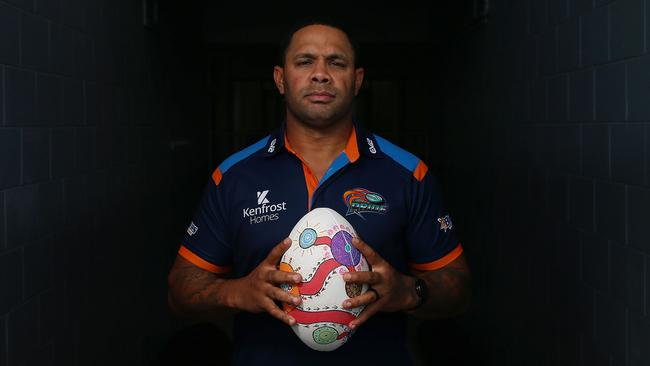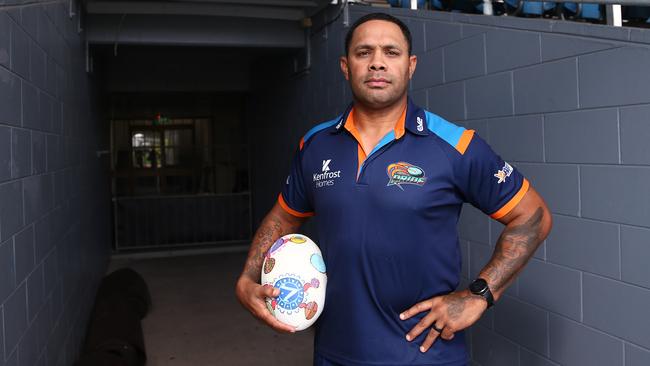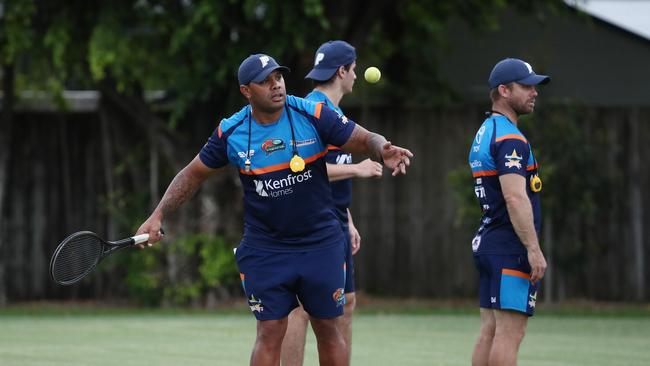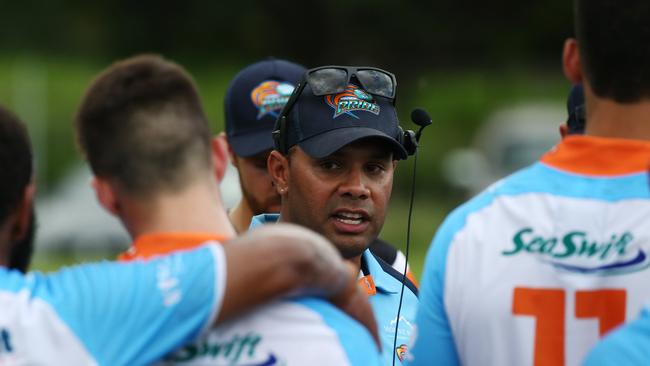Former Cowboy Ty Williams on his South Sea Islander heritage
Ty Williams talks about the importance of understanding his culture and history to mark South Sea Islanders National Recognition Day.
News
Don't miss out on the headlines from News. Followed categories will be added to My News.
To an outsider, Ty Williams is a successfully retired rugby league player who represented Queensland in State of Origin and has made the transition to coaching in the Intrust Super Cup.
But for Williams, the man, he is a son, husband and father who places high importance on his cultural background as an Australian South Sea Islander.
August 25 may be just another Wednesday to much of the Far North’s population, but for descendants of South Sea Islanders it is a day to remember and recognise 158 years of history; it was on this day, in 2012, that Australian South Sea islanders National Recognition Day was finally recognised.
Mal Meninga is perhaps the most well-known South Sea islander in Australian sporting circles.

The retired rugby league icon, history-making Queensland Origin coach and current Australian Kangaroos coach was featured on an episode of SBS’s Who Do You Think You Are?
In 2016, where he travelled to the South Sea Island of Tanna in the Vanuatu island group to trace his family’s history.
Williams’ ancestors (on his father’s side) are from the Island of Malekula in New Hebrides, now known as Vanuatu, and were among the more than 50,000 people kidnapped, “blackbirded” or deceived into coming to Australia.
South Sea islanders have played a major role in Australia’s history, but it wasn’t until 1994 that the Commonwealth Government recognised them as a distinct cultural group.
A formal recognition statement from the Queensland Government in 2007 formally recognised South Sea islanders’ contributions to economic, cultural and social development of the Sunshine State, and acknowledged past injustices.
Williams is well aware of the history – the family’s true background was so important to Williams’ father that it was taught at an early age.
MORE NEWS:
WATCH: Gruggen reunites with ‘pain in the butt’ Djeric at Snakes
Top jockey eyes off Cups double with Fortification
Lions’ nervous wait to learn finals fate, Saints snag silverware
Cairns Newmarket: Victory just what the Doctor ordered
His ancestors were brought to North Queensland, first to Mackay but eventually to Innisfail, where Williams was born, raised, played his junior footy then went on to play 151 games for the Cowboys and three Origins for the Maroons.
But Williams has always maintained a strong understanding of his identity and cultural background.
“You’ve got to remember, the reason why South Sea islanders, my heritage background, were brought to Australia was to be slaves,” Williams said.
“That’s the honest truth about it, they were “blackbirded” to be brought across here.
“So when we obviously ended up in Innisfail, we were there to obviously do a job and that was the biggest thing.
“I think as generations being passed through that there was always a recognition of the history and why it was there. But over time, it’s gotten better and better.

“I didn’t personally run into any (racism), my father may have, but in saying that, they were there to do a job and that was to cut the cane, do the cotton fields in New South Wales. So yeah, they were there for a purpose.”
And how does this sit with Williams?
“It’s an interesting one,” he said.
“Obviously, it’s the same with a lot of indigenous cultures, what’s happened and unfolded, we can’t change that. But what we can do is educate and make sure that never happens again.
“And that’s obviously through voice and recognising what was done was wrong.
“You’ve got to remember, from the 1860s to the 1900s, 55,000 South Sea islanders were brought to Australia to actually be slaves.
“That was the biggest thing. They were blackbirded, they were tricked to come over by fleets coming through the islands.
“For my background, they were tricked to come here but they never knew where they came from.

“Our family got dropped in Mackay, around that region, to cut the cane, but they never knew where they came from because they were tricked to get across here.
“That was probably the biggest thing with my father, was retracing where we originated from.
“(With) the Solomon Islands, originally that’s the area that we’re from ... there’s so many small islands (around there) and the more you dig you think gee we could be from here or from here, but eventually dad got to the end of it and he started educating myself and the family.”
There is a heartbreaking twist to this tale.
While Williams’ father contributed years of research to the extended family’s research into their past, and passed on years of knowledge to his son, he never got the chance to return to the their ancestral home.
“My aunties have been back there but my dad’s fear was flying, he never got the chance to get across there,” Williams said.

“But yeah, my aunties have been across there and they got some really good background and history on how it all eventually made it to Australia.”
And that knowledge won’t rest with Williams. The 40-year-old pledged to teach his children about their cultural backgrounds, keeping the story of his family going for another generation.
“They are definitely lessons I passed on,” he said.
“Both my kids are fair skinned kids, so I educate them on exactly what the background is of myself and them as well. And I think they need to understand that.
“I think the biggest thing about it is that it’s something that’s been around for generation to generation, and it’s something that you don’t want to die with.
“So the education tool that you can have with it is so important in understanding. What they do with that is going to be completely up to them, but at least they know.”
Williams’ cultural background has made him an even more effective rugby league coach.
His role is more than just what happens on the field, and with the Pride uniquely positioned as a club which provides opportunity and a key pathway for Indigenous footballers to reach the NRL, a deep understanding of that “shared” history has helped him connect more with players.
“It’s probably even more important now because I hold a fairly key role within the role I play with rugby league being at the forefront of a lot of sports, but also identifying my culture, our culture and, and recognising that exactly what it’s about so it’s a very important tool to have,” he said.
“It’s an advantage because I’ve got the connection with them, first and foremost.
“That’s something that I’ve had for a very long time with the understanding side of things. But also on the flip side, I respect people’s thoughts and opinions on exactly what’s unfolded.
“Our ancestors have gone through very similar, and I think the connection that I have is a very powerful tool, and the ability to educate people, both on and off the football field, as well. But also understand backgrounds.”
Originally published as Former Cowboy Ty Williams on his South Sea Islander heritage


